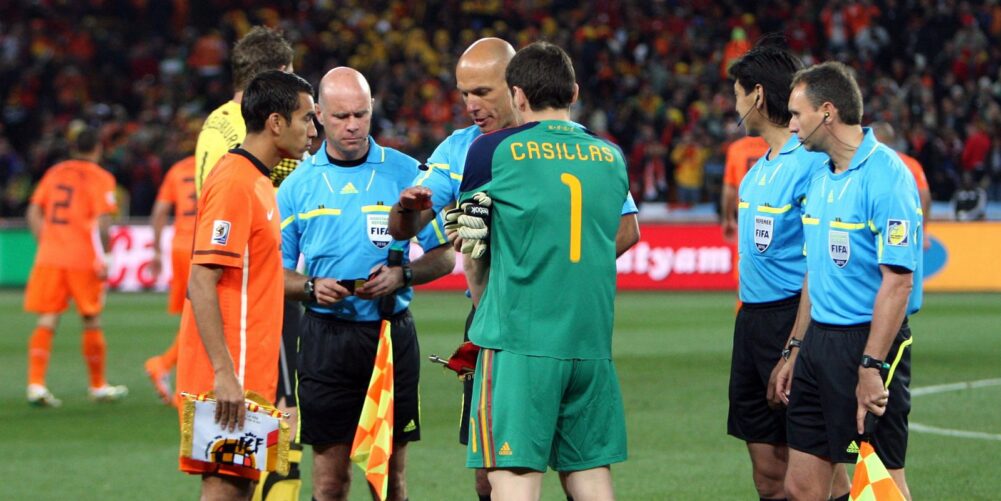BIG STAGE: Howard Webb takes charge of the 2010 World Cup Final – like many elite officials, he progressed through Non-League to the very top of the game.
PICTURE: Action Images
The Football Association and The Non-League Paper have teamed up to bring you a series of exclusive columns and features.
This month, Senior Referee Officer at The FA, Farai Hallam, gives an insight into developing Premier League officials of the future, why every game matters and how the Step 3 & 4 restructure will impact appointments.
Changing face of match officials
Previously there has been a perception of who a referee is and what they look like – now they come from all walks of life and backgrounds.
We meet our new Level 3 referees every July. You could line those 90-100 people up in any walk of life and you wouldn't necessarily pick them out as referees. They are young, many from BAME backgrounds and more and more females – probably not what you'd expect 20 or 30 years ago.
People are really seeing refereeing as a career where they can really achieve. This could either be at the elite level, where it can be a full-time career, or taking charge of games in front of big crowds, even in Non-League football. People really aspire to take charge of important games where they can have a really positive influence.
Every game matters to players, managers, clubs and supporters – but also referees. If they have ambition to progress, they know they also need to perform. One bad decision could change your season. Just like promotion and relegation for clubs, it's the same for officials.
For every game someone referees, there are two marks – one from each club. There are also observers out watching and that is put into an Observers Merit List. The two are compared and more often than not, are not too dissimilar.
If you're showing in a season you are consistently one of the best referees, you have a good chance of promotion.
It's much like a player culture. If you prove you are good enough you will get an opportunity at the next level. Why should you be held back if you're the best National League North referee even if you are in your early 20s? Similarly if you're 52 – just because you have less active years in front of you, it doesn't mean you shouldn't be able to progress up.
It gives service to competition and also rewards the referee.
From Non-League to the World Cup final
The National League System structure in this country provides an unbelievable learning experience for English match officials. As a country we are blessed we have this 150-year-old structure that has effected itself now into such a strong Pyramid.
In the ninth tier of football in this country can mean refereeing in front of 1,000 people. In other countries the ninth tier could be a local park. So it's real credit to the structure, the clubs, the teams and the players for providing such good quality for referees to get such good experience at what can be an early stage of their career. You grow with the Pyramid.
We always use Howard Webb as the example. Like every referee we now see in the Premier League, he came through the National League System. He was in charge of Northern Counties East games, the Northern Premier League and so on. In 2010, he took charge of the World Cup Final between Spain and Netherlands.
Increase in appointments at Step 3&4
With the additional Step 3&4 divisions being introduced into the National League System next season, it brings an increase in the amount of appointments that will have to be made.
The appointments at those levels are made by the FA. We have a Northern Appointments Officer and a Southern Appointments Officer, who make a vast amount of appointments and re-appointments each season.
A Level 3 referee, who takes charge of Step 3 and 4 matches, will on average have between 30 and 40 appointments per season. Some will also act as assistants on the National League as well as the National League North and South divisions.
But just taking Steps 3 and 4, it will increase by two or three games per referee. That might not sound much, but if you times that by 330 Level 3 referees it soon adds up.
Every April and May, we have a calculation that looks at the amount of fixtures we'll have the next season, geography, the average availability time of any Level 3 referee – work commitments, the average injury time, availability over Bank Holidays, Christmas and New Year – and gives us a number of how many referees we need.
Education and development
This is a side that, naturally, people don't always see. We at The FA, alongside the PGMOL (Professional Game Match Officials Limited), have made a vow to offer more training, education and development for match officials. Not only does it service the game at Steps 4, 3, 2 and 1, it's also planning for the Football League and Premier League officials of the future. So, who is going to be the next Howard Webb refereeing the World Cup final?
FA CORE (FA Centre of Refereeing Excellence) is comprised of around 300 referees and 50 performance coaches. A number are referees at the top level while others are retired. It is designed to enhance the training and development given to the officials identified as a having potential to progress. If you've got someone on the phone three or four times a week, your chance of becoming a better referee is enhanced. Hopefully leading to better chances of promotion.
Over the past three years in England we've also taken on specialisation – people are now focusing on being a referee or an assistant referee. By people making that commitment, it says to The FA that we need to invest in them. Previously people may have wanted to keep their status as a Level 3 referee and take charge of, say, Wingate & Finchley, but only so they could run the line at Leeds United the week after. Nowadays it's, ‘I'm refereeing at Wingate & Finchley because I want to'.
Improving relationships
Previously a referee has been seen as out on their own, working in silos. When you actually sit down and explain to clubs what we're trying to do and the positive impact the work with referees has, they are very receptive to it. For the first time this year, we've offered visits to all clubs at Step 1 to 4. A member of The FA or PGMOL will go and talk about what's topical, what laws have changed and explain to clubs how they can really help themselves.
It's also an opportunity for clubs to offer their thoughts on things they may be confused on or bits of law that they have queries on.
We also attend the National League, Isthmian League, Northern Premier League and Southern League pre-season meetings. It's vital there is a two-way relationship.
*This article originally featured in The @NonLeaguePaper which is available every Sunday and Monday



















